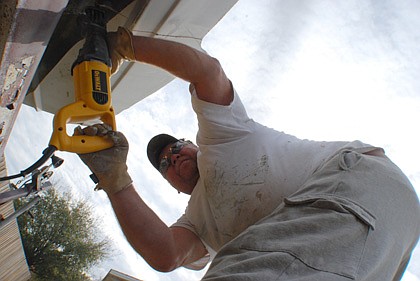- April 18, 2024
-
-
Loading

Loading

Steve Moreira pulled up to the beige house and immediately the buzz of a heavy duty reciprocating saw floated from the backyard, through the open house to the driveway. The beast of a power tool is commonly called a Sawzall because, well, it saws all.
Moreira laughed at the sound because he knew what was in store. In the backyard, a two-man crew was using the vibrating blade to cut a boat into bite-sized pieces and load it onto a pick-up truck's bed.
Mike Allen lamented the dismantling of the boat because, frankly, it's a nice boat.
"Well, the trailers all messed up or we would've pulled it out of here," says Allen, the saw's operator, wearing a white T-shirt flecked with green paint. "The trailer's already kicked in. If we tried to pull it down the road, it probably would have collapsed because everything's rusted."
Moreira, the former president of the Orlando Realtors' Association, says these are just some of the problems he and his investors encounter on a regular day. Two years ago, Moreira was buying commercial real estate properties low and selling them high, places such as corner gas stations.
Business was booming — until the bust. Now, sitting in the wake of the worst economic downturn since the Great Depression, Moreira again finds himself playing a vital role in the largest part of Orlando's real estate market.
He works for investors, who pool millions of dollars together and buy distressed homes in large chunks from banks. Then Moreira and his crews work their magic — cutting up boats, pulling out sheds, turning green pools blue again — so that the property can again be sold.
It's a business that's growing — and misunderstood. Moreira calls it the "underground realty market."
"That's a profit center," Moreira said. "If you can get a hold of 100 non-performing loans, and you're paying 20, 25 cents on the dollar, and you've got access to all the tools you need … that's the type of thing that somebody can still make a profit on."
In January, the Orlando real estate market set a record, with three out of four homes being sold by the bank or through a short sale, dropping the median price of existing homes to $103,000, a 14 percent drop from the month before.
Randy Anderson, a Howard Phillips Eminent Scholar Chair and real estate professor at the University of Central Florida, said that, in the most simplistic terms, investors are buying low and selling high. He said that, while buying distressed bank properties has always been an industry, it's growing, with some hedge funds and institutional investors getting into the mix.
"It's not new that people try to buy distressed assets from banks and try to do interesting things," Anderson said. "It's actually becoming more of an industry and a little more organized right now.
"A lot of this is happening because most people believe that on the residential side … we're at or near the bottom," Anderson said. "Especially for homes at or below median price range."
Moreira currently has 12 homes he's working on, with 20 more homes coming down the pipeline to be repaired. On average, it takes a four-man crew no more than three weeks to get a home ready for the market, usually costing about $1,500 (cutting up a boat costs extra, though).
When a buyer takes a look at the home, they can sometimes qualify for a 203K program, which will allow them to borrow an additional $35,000 on top of the cost of the home to put in repairs.
But, Moreira said, the guy getting the best deal can do the repairs on his own.
"You have to factor in that extra money for things you're not anticipating," Moreira said. "So maybe buying a home that's properly priced on the market makes sense unless you're extremely handy yourself and have access to discount products."
Or, as Anderson said, this may not be the time for your first foray into real estate investment.
"It's not amateur hour," Anderson said. "You need to know what you're doing. You can still make a mistake, even in a down market."
Talking to Moreira about the heyday of real estate in Florida, he sounds a little like he's talking about a lost love, or the 80-pound Marlin that got away. He's been in the business in Florida since the 1970s, and he made just one mistake. He put all the money he made back into real estate.
"All of this is at a loss," Moreira said. "It was all underwritten at double the price of what you can sell for now. When you say, how was the heyday, the heyday was double the price, for even substandard products.
"And yeah, I'm very comfortable saying that's gone and not gonna return," Moreira said.
Does he wish it would?
"Every day," Moreira said. "But not if it's gonna ruin the country. And it seems like it's ruined at least Florida. Florida — it's ruined for a long time."
Homes sales statistics
A record 73.42 percent of January real estate closings were either bank-owned or short sales, according to the Orlando Regional Realtor Association data. That dropped the median price of a home by more than 14 percent, from $120,000 to $103,000.